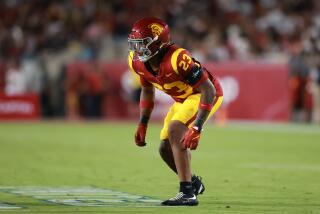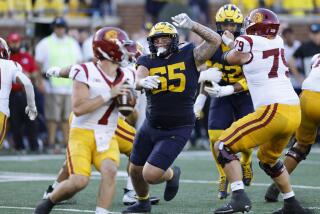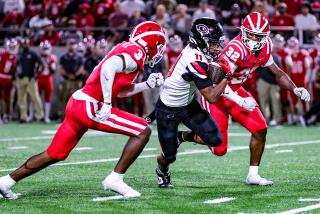Primary Focus on Secondary
Playing defensive back requires a kind of fatalism, a grim acceptance that comes from getting beat on more slants and fade routes than a sane man would care to imagine.
Dennis Thurman came to grips with this reality while playing the position at USC in the mid-1970s and for nearly a decade in the NFL. He became a success by learning to fail.
“We all fail,” he says. “It happens in life. We attempt things and someone else is better than us, someone gets it done and we don’t.”
There is, however, a corollary.
“You have to say, ‘I got beat but I won’t give up.”
It is a philosophy Thurman has preached constantly in the eight years since he became USC’s secondary coach, a message he has needed to deliver all too often this fall.
The Trojan secondary was supposed to be anchored by senior Antuan Simmons at one corner, junior Kris Richard opposite him and senior Ifeanyi Ohalete at safety. But illness and injury have kept these veterans off the field much of the time.
The burden has fallen instead to a group of sophomores who are gaining experience not as spot players but as starters. Sometimes they hold their own. Other times, such as last Saturday against Oregon, they get torched.
“Instead of allowing these guys to grow into the position, now the pace is accelerated,” Thurman says. “Everything is moved ahead.”
In the struggle to stay afloat, the underclassmen say they have relied on their coach.
“He’s like a father figure,” cornerback Darrell Rideaux says. “I don’t know what I’d do without him.”
*
Things can turn sour in a hurry. All it takes is a couple of enemy pass completions.
“The guy who is battle-tested, he knows he’s going to win his share, he’s not going to get shook up,” Thurman says. “But when you’re not accustomed to it, you get on your heels.”
The Trojans have appeared shellshocked at times. They have rotated their defensive backs--especially cornerbacks Rideaux, Kevin Arbet and Chris Cash--in hopes of finding the right combination.
But the team has slipped to sixth in the conference in pass defense, giving up 216 yards a game. Opposing quarterbacks have picked on Rideaux because he stands 5 feet 9. Cash, a junior college transfer, has had to adjust to big-time college football.
“It’s been rough,” Arbet says. “We’ve had to fight through it and try not to be timid.”
Still, Thurman insists he has the makings of a solid secondary.
“They’re all more talented than I ever was,” he says. “They can do things physically that I could only dream of doing.”
The assistant coach cuts a striking figure, still lean from his playing days, his head clean shaven. His face looks equally comfortable in a scowl or laughter, well suited to what he calls his “tough love” approach to coaching.
“He’s not going to beat around the bush,” says safety Troy Polamalu, another sophomore.
At practice, Thurman harps on technique. His players--suitably chastened--have been staying late every day this week. In the meeting room, Thurman critiques each error that appears on the films.
“But at the same time, he’s also loving,” Rideaux said. “He’s not going to push us to the point where we lose confidence.”
That’s where Thurman has concentrated much of his efforts--on the mental approach to the game. He needs his secondary to put Oregon in the past and prepare for Stanford on Saturday.
One by one, he has pulled his younger players aside and warned them hard times befall every defensive back, even the likes of Jason Sehorn and Daylon McCutcheon, former Trojans playing in the NFL.
“That’s just how it is,” he has explained.
Thurman has a slight advantage in peddling this notion--his success in the NFL buys him instant respect. Yet, oddly, he almost never mentions that part of his life.
Rarely does the two-time All-American talk about his days at USC, about playing on the 1974 national championship team or leading the conference in interceptions as a junior.
Nor does he spin tales of his seasons with the Dallas Cowboys and the then-St. Louis Cardinals, his trip to the 1979 Super Bowl, his selection to the 1981 Pro Bowl.
“He’s not the bragging type,” Polamalu says. “He’s not going to tell us he did this or he did that.”
There is one exception to the rule.
“He tells us about the mistakes he made,” Polamalu said. “So we can learn from them.”
*
It takes a certain type of person to handle the position. After Thurman’s sophomore season, former coach John Robinson asked him to switch to receiver, where he had played part time.
“On offense, it was too restrictive,” Thurman says. “You’ve got to run eight yards and do this or do that. You may get the ball or you may not the ball. Forget it.”
Better the thrill of the one-on-one matchup, of being the last line of defense.
Thurman took to heart the cliche about defensive backs having short memories. Learn from each mistake, discard it and move on. Slowly, he began to embrace this as a creed. It guided him through life outside football, through a difficult divorce.
“It helped me tremendously,” he says. “Ultimately, I figured things out and became a better person.”
So this lesson he passes along, on the practice field, on the sideline, over the course of a season in which USC has been forced to rely on an unproven secondary.
“He’s constantly teaching us,” Arbet says. “We believe what he says.”
It is a recipe for staying afloat in rough waters, a way to keep sane as a defensive back. And as a secondary coach.
“We’re going to be fine,” he tells them. “We’re going to fight through this.”
More to Read
Go beyond the scoreboard
Get the latest on L.A.'s teams in the daily Sports Report newsletter.
You may occasionally receive promotional content from the Los Angeles Times.







